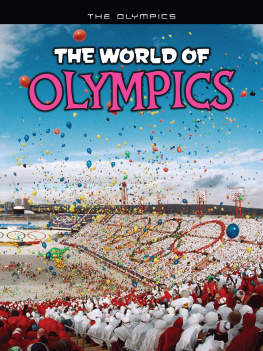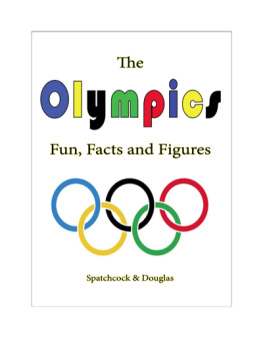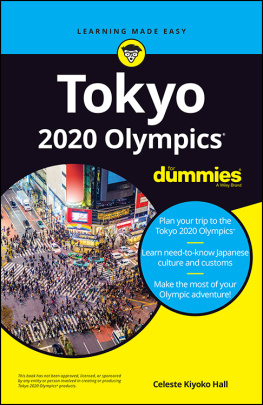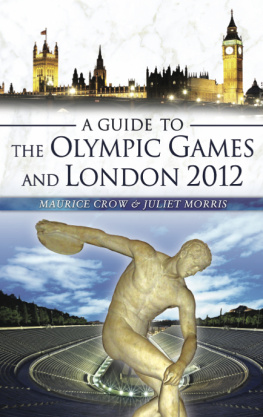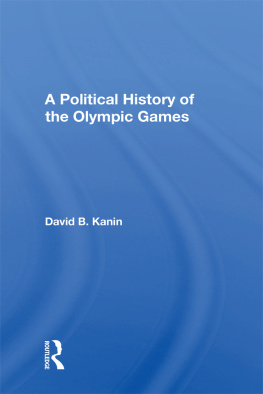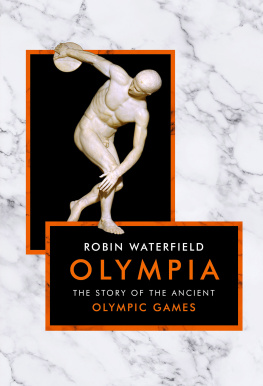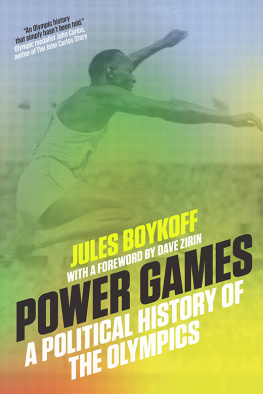THE OLYMPICS AND PHILOSOPHY
THE OLYMPICS
AND PHILOSOPHY
Edited by Heather L. Reid and Michael W. Austin

Copyright 2012 by The University Press of Kentucky
Scholarly publisher for the Commonwealth, serving Bellarmine University, Berea College, Centre College of Kentucky, Eastern Kentucky University, The Filson Historical Society, Georgetown College, Kentucky Historical Society, Kentucky State University, Morehead State University, Murray State University, Northern Kentucky University, Transylvania University, University of Kentucky, University of Louisville, and Western Kentucky University. All rights reserved.
Editorial and Sales Offices: The University Press of Kentucky 663 South Limestone Street, Lexington, Kentucky 40508-4008 www.kentuckypress.com
16 15 14 13 12 5 4 3 2 1
Library of Congress Cataloging-in-Publication Data
The Olympics and philosophy / edited by Heather L. Reid and Michael W. Austin.
p. cm.
Includes bibliographical references and index.
ISBN 978-0-8131-3648-6 (hardcover : alk. paper)
ISBN 978-0-8131-3650-9 (pdf) ISBN 978-0-8131-4071-1 (epub)
1. OlympicsPhilosophy. 2. OlympicsHistory. I. Reid, Heather Lynne, 1963II. Austin, Michael W.
GV721.6.048 2012
796.48dc23
2012013534
This book is printed on acid-free paper meeting the requirements of the American National Standard for Permanence in Paper for Printed Library Materials.

Manufactured in the United States of America.

| Member of the Association of
American University Presses |
To all the coaches and athletes
who realize that the Olympic ideal
is about more than sport
CONTENTS
Michael W. Austin (USA)
Raymond Angelo Belliotti (USA)
Scott F. Parker (USA)
Paul A. Cantor (USA) and Peter Hufnagel (USA)
Jess Ilundin-Agurruza (ESP)
Heather L. Reid (USA)
Douglas W. McLaughlin (USA) and Cesar R. Torres (ARG)
Milan Hosta (SLO)
Jeffrey P. Fry (USA)
Stephen Kershnar (USA)
Joseph D. Lewandowski (USA)
Regan Reitsma (USA)
Pellom McDaniels III (USA)
Kutte Jnsson (SWE)
Charlene Weaving (CAN)
Charles Taliaferro (USA) and Michel Le Gall (FRA/CAN)
Alun R. Hardman (GBR) and Hywel Iorwerth (GBR)
Matthew Sharpe (AUS)
INTRODUCTION
Philosophy and the Olympic Games not only share an origin in ancient Greece; the modern Olympics are the first and perhaps the only sports movement explicitly guided by a philosophy of life. This philosophy of life is known as Olympism. The Fundamental Principles of Olympism, which are articulated in the Olympic Charter, guide the movements values and aims, including its commitment to international cooperation and peace. The symbolism of the Olympic rings communicates the Olympic philosophy: each ring represents one of the five continents, and the colors represent all of the national flags of the world. The interlocking rings on a background of white symbolize the bringing together of these nations in peace. The Olympic rings are one of the worlds most recognizable symbols, but even a passionate fan might be unaware of the philosophy they symbolize. It is the purpose of this book to explain and explore Olympic philosophy.
Each chapter in this book looks at the Olympic Games from a different philosophical perspective. What they have in common is a concern for understanding all of the elements of the Olympic Games: the history and heritage, the ideals, and the politics of the Games. Philosophical issues arise in all of these various aspects of the Olympics. This is true of many realms of life, not just sport. But what sets the Olympics apart is that at its heart, the Olympic movement is a philosophical movement. The contributors to this volume explore the philosophy of the Olympics as it relates to athletic excellence, moral development, issues of race and gender, nationalism, politics, and a host of other issues.
, The Ideal Olympian, explores the concept of Olympic excellence as embodied in particular athletes. Michael Austin kicks off the section by asking what, for the Olympian, does it mean to be great? For many, the answer has simply to do with gold medals and Olympic or world record performances. Austin, however, instead employs some of Aristotles ideas, arguing that true Olympic greatness includes moral excellence. He illustrates his thesis by examining the lives of three OlympiansEugenio Monti, Wilma Rudolph, and Emil Ztopekto uncover the links between moral and athletic excellence. In the second chapter, Raymond Angelo Belliotti considers the philosophy of Niccol Machiavelli as it connects to the career of the Italian sprinter Pietro Mennea, a.k.a. The Southern Arrow. Menneas Machiavellian physical prowess and mental toughness may seem at odds with Olympic ideals such as international peace and brotherhood. But even if Machiavelli would reject those ideals, he would praise the international competition fostered by the Olympic Games and the athletic excellence on display during Menneas twenty-year sprinting career. Finally, in Whats More than Gold, Scott F. Parker explores the case of Steve Prefontaine, one of the greatest American distance runners of all time, who failed in his career to win Olympic gold. Nevertheless, argues Parker, Pre embodied the essence of the Olympics and the overlapping ideals praised by the philosophers Friederich Nietzsche and Ralph Waldo Emerson. The point of an Olympic race is not winning, but something else, and Pre embodied that something else as well as anyone.
the philosophy of Plato and Aristotle with the enduring experience of competitive athletics. Reid argues that the ancient Greek concept of aret (virtue) should be the real goal of Olympic sport, even in the modern world.
Modern Olympic ideals are the subject of . Douglas W. McLaughlin and Cesar R. Torres begin by interpreting the nineteenth-century philosophy of Olympism in terms of the contemporary philosophy of phenomenology, specifically the notion of intersubjectivity, which focuses on the communal aspect of human experience. The intersubjective approach not only enriches the modern Olympic movements philosophical goals, including peace and education; it also resolves the apparent conflict between the Olympic motto and creed by noting that participation in a given sports testing family is necessary and constitutive of striving for excellence. In his chapter, Milan Hosta continues to explore the paradoxical nature of Olympism in its individual, international, and transnational guises. He argues that Olympism begins and ends with individual athletes, whose personal striving and achievement inspire both their home nations and then humanity in general, thereby providing the common ground necessary for internationalism as well as the institutional focus characteristic of transnationalism. Jeffrey Fry concludes the section by considering whether the Olympic motto, Citius, altius, fortius, should be modified to include the term Virtuous. He acknowledges that virtue is a key value in the Olympic Games, but he finds practical, political, and epistemological problems with the idea of instituting regular awards, such as medals, for athlete virtue. Fry concludes that infrequent Fair Play awards can express the value of virtue without threatening the thing they are trying to reward.
Next page

